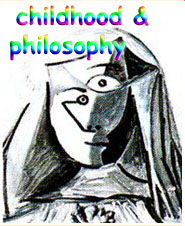the richness of questions in philosophy for children
DOI:
https://doi.org/10.12957/childphilo.2019.43353Keywords:
community of inquiry, questions, opacity, transparencyAbstract
This paper argues that the various approaches within P4C (Philosophy for Children) should purposefully integrate the exploration of questioning instead of only presenting children with prepared questions as starting points for inquiry. This is particularly relevant since P4C is one of the few educational settings that offers a space for children to question and explore the variation of their questions’ impact. The purposeful integration of questions does justice to the inheritance of the philosophical tradition, and reinforces questions as a privileged way for human beings to relate to the world. More than simply a methodological step in designing a P4C session, questions are an educational resource and are a central part of thinking and inquiry in a philosophical session. The paper proposes a new way to leverage these tools, arguing that defining philosophy as an obsession to overcome opacity and aim for transparency (Caeiro, 2015) can help participants identify questions that may empower dialogue in a philosophical way.
Downloads
References
Brandt, R. (1988) “On Philosophy in the Curriculum: A conversation with Matthew Lipman”, Educational Leadership, 46 (1), 34-37.
Cam, P. (2006) Twenty Thinking Tools. Collaborative Inquiry for the Classroom. Victoria: ACER Press.
———. (ed) (1993) Thinking Stories. Sidney: Hale & Iremonger.
Costa-Carvalho, M; Mendonça, D. (2017) Thinking as a Community: Reasonableness and Emotions. In M.R. Gregory, J. Haynes, K. Murris (Eds) The Routledge International Handbook of Philosophy for Children (pp. 127-134). London/New York: Routledge.
Dennet, D. (2006) Breaking the spell – Religion as a Natural Phenomenon. London: Penguin.
Douglas. Helen. (2005) It Begins with Desire: Questions of Philosophical Practice. Janus Head, 8 (2), 409-420.
Fisher, R. (1995) Teaching Children to learn. Cheltenham: Standley Thomas Publishers.
______. (1995) “Socratic Education: a new paradigm for philosophical inquiry?”, Creative and Critical Thinking, 4 (1), 1-13.
Floridi, L. (2013) “What is a philosophical Question?” Metaphilosophy, 44 (3), 195-221.
Freire, P.; Faundez, A. (1985) Por uma pedagogia da pergunta, Rio de Janeiro: Paz e Terra.
Gardner, S., (1995) “Inquiry is no mere conversation (or discussion or dialogue): facilitation of inquiry is hard work!”, Critical and Creative Thinking, 3 (2), 38-49.
Kennedy, D. (2004) “The Philosopher as Teacher. The role of a facilitator in a community of philosophical inquiry”, Metaphilosophy, 35 (5), 744-765.
Kohan, W.; Wuensch, A M. (1999) Filosofia para Crianças: a tentative pioneira de Matthew Lipman. Editora Vozes: Rio de Janeiro.
Kohan, W. (2014). Philosophy and Childhood: Critical perspectives and affirmative practices. Palgrave: New York.
Kohan, W.; Kennedy, D., (2017) “On the risks of approaching a philosophical movement outside of philosophy”. childhood & philosophy, 13 (28), 493-503.
Lipman, M. (2003) Thinking in Education. Cambridge: Cambridge University Press.
———. (1997) “Thinking in Community”, Inquiry: Critical Thinking Across the Disciplines, 16 (4), 6-21.
———. (1996) Philosophical Discussion Plans and Exercises. Analytic Thinking, 16 (2), 64-77.
Lawm S. (2003) The Philosophy Gym. London: Headline Book Publishing.
Matthews, G. (1992) “Thoughts after Piaget”. In J. Portelli & R. Reed (eds) Children, Philosophy and Democracy, (pp. 65-73). Calgary: Detselig Enterprises Ltd.
Mulligan, K., Simons, P. & Smith, B. (2006) “What’s wrong with contemporary philosophy?” Topoi, 25, 63-67.
Murris, K., & Haynes, J. (2002). Storywise: Thinking through stories. Newport: Dialogue Works.
Peirce, C. S. (1868) “Some Consequences of Four Incapacities.” In J. Butler (Ed) Philosophical Writings of Peirce. New York: Dover Publications, pp. 228-250.
Russell, B. (1959). The problems of philosophy, Oxford: Oxford University Press. available on line http://emilkirkegaard.dk/en/wp-content/uploads/Bertrand-Russell-The-Problems-of-Philosophy.pdf (Accessed last December 4th, 2018)
Sharp, A. M. (1987) . “What is a ‘Community of Inquiry?’, Journal of Moral Education, 16 (1), 37-44.
Sharp, A. M. (2017). “Philosophical Novel”, In Saeed Naji & Rosnani Hashim (eds.) History, Theory and Practice of Philosophy for Children: International Perspectives, (pp. 18-29) London/New York: Routledge.
Splitter, L.; Sharp, A. M. (1995) Teaching for Better Thinking: The Classroom Community of Inquiry. Victoria: ACER Press.
Turgeon, W. (2015) “The Art and Danger of the Question: Its place Within Philosophy for Children and Its Philosophical History” Mind, Culture and Activity 22 (4), 284-298.
Weber, B; Wolf, A. (2017) Questioning the Questions. A Hermeneutical perspective on the ‘art of questioning’ in a community of philosophical inquiry. In M.R. Gregory, J. Haynes, K. Murris (Eds) The Routledge International Handbook of Philosophy for Children. London/New York: Routledge, pp. 74-82.
Worley, P. (2015). “Open thinking, closed questioning: two kinds of open and closed questions”, Journal of Philosophy in Schools, 2 (2), 17-29.
———. (2011) The if machine. London, England: Continuum.
Wartenberg, T. E. (2009). Big ideas for little kids: Teaching philosophy through children’s literature. Lanham: Rowman & Littlefield Education.




